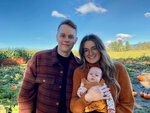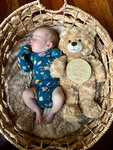
.jpg)





Thanksgiving this year heralds a time of great joy as our family celebrates its first holiday with my great-niece who was born in August, but a sting of sadness lingers as we remember her big brother who never took a breath.
Two years ago, we eagerly awaited the arrival of my niece’s first child, Lincoln Hayes Riat, who was due on Feb. 6. My niece, Robyn, a fourth-grade teacher in Washougal, and her husband, Danny, a nurse in Vancouver, had been married several years, purchased their first house and prepared to start their family.
The day after Christmas in 2021, Robyn noticed the baby quit moving as much as he had earlier.
“I remember calling my mom and telling her I was concerned, and I called the nurse line several times,” Robyn recalled. “They kind of kept telling me, ‘oh, just lay down and feel for him.’ They just made me feel like it was kind of normal or it wasn’t a big deal.”
But it was.
“So then I went in on New Years’ Eve and told them I was concerned,” Robyn said. “They continued telling me everything’s fine. He’s moving. They were tracking his heart rate.”
They conducted a biophysical profile looking for small movement, large movement, the heart rate at a certain threshold, and practice breathing. Lincoln scored six out of eight because he wasn’t doing practice breathing, and Robyn never saw a large movement, either, but the technician marked one.
“I kind of just felt the ultrasound tech was upset because it was New Year’s Eve, and she was having to work, and she kind of just rushed through it,” Robyn said. “I just didn’t feel she did that good of a job.”
The nurse thought they’d keep her overnight for monitoring, but instead Kaiser staff sent her home.
“I was still concerned because I’m not feeling him and she said, well, he’s moving in there,” Robyn said. “It kind of made me feel like I just wasn’t trying hard enough to feel him. And I was a first-time mom. I didn’t know. They tell you that when you get farther along, they get bigger and their movements change, so I was like, OK, that must be how his movement changed.
“They were so relaxed and thought everything wasn’t a big deal. It kind of made me feel this confidence that everything’s OK.”
But it wasn’t.
She called probably five times during the new year, concerned about the lack of movement, but medical folks reassured her it was normal, especially since she had anterior placenta, which she never knew until then. They likened it to the baby kicking through a pillow to reach her stomach.
Then, on Jan. 12, 2022, she and Danny went to the clinic for a regular ultrasound. They couldn’t find Lincoln’s heartbeat.
Danny screamed.
“Probably the worst moment of my life,” Robyn whispered through her tears. “Just pure shock.”
They discussed options: waiting for her body to go into labor or inducing labor.
Either way, she had to deliver a son she knew had died inside her womb.
“I kind of had this hope that maybe they were wrong,” Robyn said. “I asked the doctor, how certain are you? She said she was 100 percent. But I had this hope even after he was born that maybe they were wrong.”
They told her to go home, change clothes and eat something.
“I remember trying to eat something and I felt this movement. I swore I thought it was him,” Robyn said. “It’s the same movement I felt the last few weeks that I was pregnant with him.”
That night, they returned to the hospital, where her labor was induced.
They all hoped for a miracle, perhaps Lincoln’s heart still beat inside his tiny body.
“I think the absolute worst moment of it was after he was born,” Robyn said. “I was done pushing and everything — and then just to hear silence.”
Nobody knew what to say.
“You normally hear your baby cry,” Robyn said, wiping tears from her eyes. “I was just terrified to look because they said they didn’t know how long before he’d passed, and the body starts to deteriorate.”
An autopsy on Lincoln Hayes Riat, born Jan. 13, 2022, three weeks and three days before his due date, showed he had died only two days earlier. They don’t know why.
“I guess it’s really common with stillbirth that they don’t actually ever figure it out,” Robyn said.
He looked perfectly well formed. Ten tiny fingers and toes with tiny nails. Red-brown hair. Nothing amiss.
Doctors described it as similar to Sudden Infant Death Syndrome, or SIDS, when a baby stops breathing for no apparent reason. Lincoln’s heart just stopped beating.
During the delivery, hospital staff gave them a choice: they could see and hold the baby or just have nurses remove him from the room.
“I don’t feel there’s any right thing, but I’m really thankful that I held him,” Robyn said. “I told him that I loved him, and I kissed him.”
Inside the hospital room at Legacy Salmon Creek, Robyn and Danny cuddled their son for four or five hours, caressing his hands, telling him how much they loved him. My sister and her husband, and Danny’s parents, cradled their grandchild. A nurse created delicate plaster molds of Lincoln’s face, hands and feet, which Robyn keeps on a shelf upstairs.
They held a small funeral for Lincoln. They cremated his remains. His urn sits behind glass in a dining room cabinet alongside his footprints.
“He’s still a part of our family, and I just want him to be included,” Robyn said.
Although they left the hospital without their baby, they still faced medical bills. They received $1,000 to cover part of the expense from a foundation called Hayden’s Helping Hands, a nonprofit formed by the parents of Hayden Ruth, who was stillborn at 32 weeks of gestation on July 6, 2010. The nonprofit helps families after the death of a stillborn by paying part or all of the hospital delivery expenses.
After three months recovering at home, Robyn returned to her classroom, although she continued lactating for another three months after Lincoln’s death. The staff had told her students what happened two days after Lincoln’s stillbirth. But students in the school’s other fourth-grade class never knew until shortly before she returned to work … and they cried.
“There were all these triggers that happened along the way,” Robyn said. “I learned a lot about grief in this time, and how a lot of firsts are really hard after you lose someone.”
Working with other people’s children proved difficult at times, especially if parents mistreated their children.
“I want to care for my own baby,” Robyn said. “And why they got their baby, and I didn’t … just hurts.”
People also didn’t know what to say to her.
“It was this terrible thing, where nobody wants to say his name,” Robyn said. “People don’t want to talk about it. But then I got very used to having to tell kids what actually happened.”
It was difficult to explain when she didn’t even know what happened.
“I found the kids were more compassionate than the adults because you could just feel they didn’t fully understand but they really felt empathetic, and they felt really sorry,” Robyn said.
When they learned of the stillbirth, some adults pelted her husband with questions such as, “Did your wife take the COVID shot?”
“Or they make assumptions that I was drinking, or that I did this or that,” Robyn said.
I asked about how people should approach someone after a stillbirth, which is described as a baby that died in utero after 20 weeks of gestation as compared to a miscarriage, which is a baby expelled from the womb within the first three months of the pregnancy. Late-term miscarriages take place between 12 and 20 weeks. All are heartbreaking losses, similar yet different.
“I don’t know,” she said. “I felt it was really important to acknowledge what happened and not just ignore it. And I feel a lot of people didn’t know what to say so they didn’t say anything.”
But validating her loss, acknowledging Lincoln’s death, and simply offering to be there if needed would have helped.
“Nothing you say is going to make it better, but just knowing that people are there if you need them to be or just hold you if you just need to cry helps,” Robyn said.
She learned from coworkers about miscarriages and stillbirths they’d suffered. People seldom talk about these tragedies. Others said they knew exactly how she felt, although they never could. Some told them to just have another child. Another said if a stillborn happens once, it’s likely to happen again.
“People have said some pretty traumatizing things,” Robyn said.
Nine months later, Robyn became pregnant again. They didn’t tell anyone until after her 20th week, past the time when most miscarriage occur, but the terror of another stillbirth loomed, even though specialists assured her stillbirths are rare.
“I was just afraid it was going to happen again,” she said.
Robyn’s therapist, Shawn Wolf in Vancouver, helped her understand her tremendous grief, panic and terror. She described it as similar to visiting a carnival for the first time, playing games, eating hot dogs, nibbling popcorn and enjoying a great time. You board a roller coaster and climb up and up and up — and then you realize at the top of the ride that the person next to you has died. You must continue; you can’t get off the roller coaster.
“You just you have to go through the whole thing, even with the person next to you that died,” Robyn said. “Getting pregnant again is like going to the same exact amusement park, experiencing the same things, eating the same popcorn, doing all the same things, and getting on the same ride and hoping that the person next to you doesn’t die. It’s just the most terrifying thing — going through the same motions and expecting a different result, but all you’ve experienced was the most traumatizing thing to ever happen to you.”
After delivering a stillborn baby, Robyn was considered high risk. She saw the doctor nearly every week, and twice a week toward the end of her pregnancy to check the baby’s heartbeat and do a biophysical profile.
“She was the one that found out that Lincoln didn’t have a heartbeat,” Robyn said. “And I thought, I never want to see this woman again because that was so traumatizing. But she ended up being one of the top doctors in her field. I talked to her, and she is literally the best doctor. She’s been so amazing and accommodating.”
Without an anterior placenta this time, Robyn saw her daughter move more frequently. Sometimes her husband or mother counted the kicks to make sure the baby was moving.
“I was scared giving birth that something would just happen,” Robyn said. “And I really I didn’t believe until I had her in my arms that I would even get her.”
In the hospital room, Robyn, Danny, and my sister all cried when Juniper Quinn Riat arrived, squirming and crying.
When she lost weight, as all babies do, panic ensued.
But today, Juniper, nicknamed “Juni,” is a beautiful, healthy precious baby.
Robyn and Danny’s daughter, their second child. She can never replace Lincoln, anymore than my son and daughter could replace one another. Children aren’t interchangeable. Each is unique.
“Now that I have Juni, just recognizing and acknowledging that he’s still a part of my life, but she doesn’t replace him now,” Robyn said. “She’ll never be Lincoln.”
As this precious niece of mine cradled her newborn daughter, she wore a chain around her neck with an engraving of Lincoln’s footprints.
“I guess I wish I would have just trusted my gut with Lincoln,” Robyn said. “I trusted the doctors instead of trusting the instinct that something’s really wrong.”
At 38 weeks, Juni’s tests showed she wasn’t doing practice breathing, and her heart rate topped 180 instead of her normal 140.
“I was just panicked,” Robyn said, “because I felt like it was happening again.”
They opted to induce labor at Sunnyside in Clackamas, Oregon, rather than wait for a room in Vancouver.
“It’s not until recently that I started feeling like I’m going to get to keep her,” Robyn said.
The tragedy drew Robyn and Danny closer, although they already had a strong relationship. They experienced the same tragedy, albeit in different ways. A baby’s cry would trigger Robyn, leaving her sobbing.
“I hold her, and I’m so thankful she’s OK,” Robyn said. “It brought us together, but I feel like grief is really weird. It keeps coming back. We are both grieving in our own way.”
But today, life is different.
“Now whenever we fight, it’s because he’s hogging her too much and I want to hold her and he won’t let me,” Robyn said with a laugh.
They treasured her first cry. Her first bath. Her first diaper change. Her first smile.
“So it’s just those moments that we missed with Lincoln, that we’re now just treasuring that we get to experience with her,” Robyn said. “Now he’ll tell me he has to go back to work so he should be able to hold her longer.”
Robyn is taking a year off work to care for Juniper. She believes Lincoln’s soul is in heaven.
“It wasn’t until Juni was born that I could start to make peace with what happened,” Robyn said. “Because I always had this attitude: Why me? Why my baby? Why didn’t he get to live? And there’s no good answer.”
Failing to talk about the death, the miscarriage, the stillborn, invalidates the experience and the life that was lost. And the beliefs held by people about when life begins complicates the trauma.
“It’s just heartbreaking that people treat their babies so badly or are smoking and doing drugs while they’re pregnant, and they still get their baby,” Robyn said. “And I didn’t get Lincoln.”
But thank God she has Juniper.
“I felt, after she was born, that I needed to change my attitude because when I thought of Lincoln, I thought of sadness,” Robyn said. “I kept telling myself he should be here. Every holiday he was missing. I would imagine what that would look like. I think because I got a year to grieve those experiences, it makes it so now I can just enjoy Juni.”
Now when she thinks about Lincoln, Robyn said, she reminds herself he’s in heaven, loved, with God holding him.
“Juniper has something that a lot of people don’t have,” Robyn said. “She has a guardian angel. She has somebody looking over her. She has a big brother.”
•••
Julie McDonald, a personal historian from Toledo, may be reached at memoirs@chaptersoflife.com.